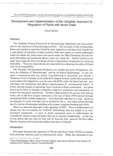Development and Implementation of the Canadian Approach to Regulation of Plants with Novel Traits
JIRCAS international symposium series
| ISSN | 13406108 |
|---|---|
| 書誌レコードID(総合目録DB) | AA1100908X |

本文フルテキスト
intlsymp-5_293-302.pdf321.87 KB
The Canadian Federal Framework for Biotechnology Regulation sets down principles for the regulation of biotechnology products. One principle is that existing legislation and regulatory expertise should be used. Agriculture and Agri-Food Canada has a long history of regulation of plant products, both with respect to variety registration under the Seeds Act, plant import and export under the Plant Protection Act and livestock feed safety and nutritional efficacy under the Feeds Act. Health Canada on the other hand using the Food and Drugs Act has a long history of expertise in evaluating food safety. These two Departments are responsible for evaluating the safety of Plants with Novel Traits(PNTs).
The Canadian Environmental Protection Act, another key piece of legislation, contains the definition of "Biotechnology" used by all federal departments. It also contains a requirement that any person "manufacturing or importing" into Canada a "Substance New to Canada'' must notify Environment Canada (unless this requirement is met under other legislation, as is the case with PNTs under the Seeds Act) and provide them with information that allows a determination of environmental safety. It is here that the concept of regulating "novel" products is firmly entrenched. Any plant that is novel (New to Canada) is therefore subject to notification and assessment, no matter how that plant was derived. Novelty is determined at the species, trait and use levels, and at the level of gene constructs in the case of those PNTs derived through recombinant DNA (rDNA) techniques. Novel herbicide tolerance in a crop species is an example of a novel trait that can be introduced into a crop plant species through use of a variety of techniques including wide crosses, mutation breeding and rDNA.
There is a step-wise approach to the regulation of PNT. Prior to authorization for release into the environment for "confined" field testing, they are subject to an environmental assessment. A more in depth assessment prior to authorization for "unconfined" release is required before they can be released commercially. In the case of crop plants that are used for food and for livestock feed, approval for food safety (Health Canada) and livestock feed safety must also be obtained.
The Canadian Environmental Protection Act, another key piece of legislation, contains the definition of "Biotechnology" used by all federal departments. It also contains a requirement that any person "manufacturing or importing" into Canada a "Substance New to Canada'' must notify Environment Canada (unless this requirement is met under other legislation, as is the case with PNTs under the Seeds Act) and provide them with information that allows a determination of environmental safety. It is here that the concept of regulating "novel" products is firmly entrenched. Any plant that is novel (New to Canada) is therefore subject to notification and assessment, no matter how that plant was derived. Novelty is determined at the species, trait and use levels, and at the level of gene constructs in the case of those PNTs derived through recombinant DNA (rDNA) techniques. Novel herbicide tolerance in a crop species is an example of a novel trait that can be introduced into a crop plant species through use of a variety of techniques including wide crosses, mutation breeding and rDNA.
There is a step-wise approach to the regulation of PNT. Prior to authorization for release into the environment for "confined" field testing, they are subject to an environmental assessment. A more in depth assessment prior to authorization for "unconfined" release is required before they can be released commercially. In the case of crop plants that are used for food and for livestock feed, approval for food safety (Health Canada) and livestock feed safety must also be obtained.
| 作成者 | Simon Barber |
|---|---|
| 公開者 | Japan International Research Center for Agricultural Sciences |
| オンライン掲載日 | |
| 号 | 5 |
| 開始ページ | 293 |
| 終了ページ | 302 |
| 言語 | eng |
